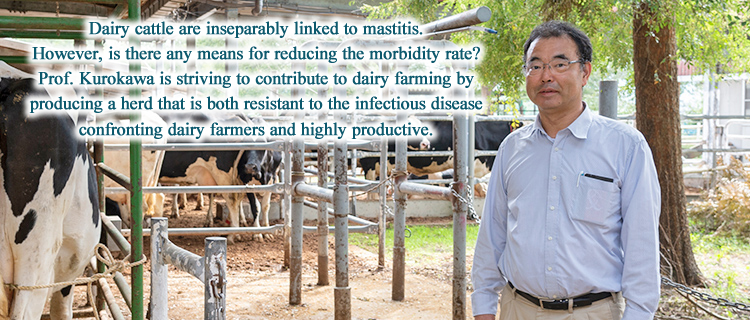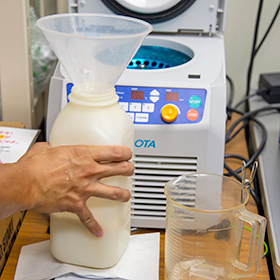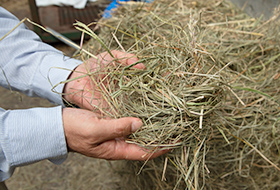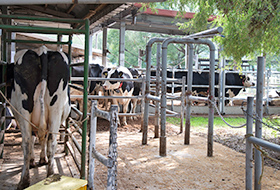 |
| |
 |
| |
| Love for Cattle and Farms Leading Him to Research on the Management of Milk Cow
Herds |
| |
 |
|
On the eastern boundary of the Higashi-Hiroshima Campus, there is a
stock farm. If you watch cattle grazing there and hear them mooing comfortably,
you will surely feel relaxed.
However, milk cows, which constitute the majority of the cattle on the farm, are
always dogged by the risk of a disease?mastitis. No matter how hard humans try
to prevent the milk cows from contracting the disease, they are plagued
by it. In some cases, no treatment works.
“How nice it would be if I could produce a herd resistant to diseases such as
mastitis!” --- this idea one day struck on
Prof. Kurokawa, who loves cattle.
|
|
| |
Prof. Kurokawa, a cattle researcher, is enthusiastic about cattle
and environments with cattle, such as dairy farms.
This is true for his students, who also love cattle and farms and conduct
research on them.
“When I was a graduate school student, I studied on the farm attached to a
university. Since I had wanted to study in such an environment, it was a very
comfortable setting for me” says Prof. Kurokawa.
Although he used to conduct research on fodder for milk cows and beef cattle, he
started to research antioxidants about five years ago, and relationships between
such substances and mastitis about three years ago. “At first, since milk cows
are prone to diseases especially in summer, I was intrigued by such seasonal
features. The range of my interest has gradually widened to cover the
relationship with mastitis.” |
|
 |
|
| |
| Presently Exploring the Relationships between the Antioxidants in Milk Cows’
Blood and Mastitis |
| |
 |
|
Prof. Kurokawa is presently conducting research on dynamics of
blood antioxidants, namely trying to find how the antioxidants in blood move and
change.
To begin with, what is an antioxidant? Prof. Kurokawa gave an easy-to-understand
explanation. “When animals breathe, “active oxygen” is generated. Since
breathing is indispensable to animals, the generation of active oxygen is
unavoidable, even though it is harmful to their bodies.”
According to Prof. Kurokawa, the capability to eliminate active oxygen is called
“antioxidant capacity,” while the
substances for eliminating active oxygen are called “antioxidants.”
|
|
| |
He speculates that this antioxidant capacity has something to do
with the protection of milk cows from diseases.
“In the process of verifying my hypothesis, I’m checking the blood concentration
of antioxidants and the conditions of
changes in the concentration. I’m also conducting research from the perspective
of individual differences based on the
assumption that different cows might originally have different capabilities to
produce antioxidants.”
|
|
 |
|
| |
 |
|
In this regard, Prof. Kurokawa is currently spending a lot of time
collecting a wide variety of types of data on milk
cows on the farm.
“A complicated mix of a wide variety of conditions determines whether cows
producing milk on the farm develop mastitis
or not. I recognize such a phenomenon involving complex factors as it is, and
collect related data, from which I try to
find what can be generalized. I can say that this is one of my research
approaches.”
|
|
| |
| Desire to Contribute Extensively to Dairy Farming by Generating a Cattle Herd
Resistant to Infectious Diseases |
| |
|




|
|
As was previously stated, what Prof. Kurokawa is striving to
achieve through this research is to produce a herd
resistant to diseases such as mastitis.
“Farmers’ profits and intensity of labor are determined by the characters of
their herds. Accordingly, I’m aiming to
produce an even better herd by identifying each cow’s features appropriately and
using individuals’ information to
ensure that cows with good features survive.”
While finding pleasure and significance in this research, Prof. Kurokawa
revealed his contradictory feelings.
“I love animals, which is the first reason that I’ve started this work. But to
produce a good herd, I need to select and
screen cows, meaning that some cows are sent off as beef cows and lose their
lives. Although the pursuit of economy is
inevitable, I feel that I need to carefully consider what to achieve and how to
proceed.”
Prof. Kurokawa also stated that research on herd management is not yet conducted
sufficiently. He indicated that it is
necessary to have an appropriate discussion on guidelines for the management of
milk cow herds.
“I hope that my findings disseminated from the university’s farm will serve as
an opportunity for farmers and
researchers with the same concerns as mine to engage in more in-depth
discussion” said Prof. Kurokawa. He added that to
even slightly reduce the number of the cases of mastitis, while its total
elimination is regarded as impossible, it is
necessary to establish a proper herd management method. “I expect that progress
in research will enable herds to be
managed in a new method that has not been available so far. After all, I would
like to be of some use, even if only a
little, to dairy farming” said Prof. Kurokawa with a smile.
He concluded by addressing the following message to young people who might join
his laboratory:
“On a farm, there are many things that you couldn’t recognize without much
attention. I feel that such things harbor
problems and challenges. I look forward to finding such challenges and solving
them together with you.”
|
|
| |
| Yuzo Kurokawa |
| Associate Professor, Laboratory of Terrestrial Field Science
April 1, 1991~ Assistant, School of Agriculture, Tokyo University of
Agriculture and Technology
March 1, 2004~ Associate Professor, School of Agriculture Field Science Center, Tokyo
University of Agriculture and
Technology
April 1, 2009~ Associate Professor, Graduate School of Biosphere Science, Hiroshima
University
April 1, 2019~ Associate Professor, Graduate School of Integrated Sciences for Life,
Hiroshima University
Posted on Jan 9, 2019
|
| |











